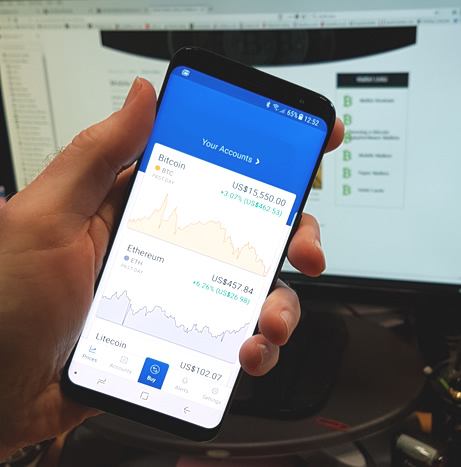Mobile Wallets

Mobile wallets are the easiest of all the different wallet types use - but, they are probably also one of the least secure. Just like a conventional wallet (which carries cash and cards) a mobile wallet is portable, and convenient.
A mobile wallet is software that runs on your smartphone, and stores your account information, Bitcoin balance and private key on the device itself. This means that you are able to buy and sell Bitcoins or pay for goods with bitcoins whilst on the move, just as you would with a fiat currency. You can even use the Near-Field Communication (NFC) capability on your phone to make quick payments on suitable Bitcoin-accepting terminals.
With all the convenience of a mobile wallet however, does come some significant security risks. Your mobile wallet is only as secure as your phone is. If your phone gets lost, and you have not backed up your wallet, then your entire Bitcoin balance could be lost as well. The very nature of the wallet being mobile is part of what makes them a target for thieves - in much the same way that you are more likely to have a conventional wallet stolen than your desktop computer.
Mobile wallets are undoubtedly key for crypto currencies moving into the mainstream. The flexibility to pay for tangible goods on the move is the aspect of Bitcoin most likely to appeal to the masses, which will change Bitcoin from a pure investment vehicle into a true currency.
Mobile Wallet Security
The first step to staying safe is to make sure that you always back up your wallet and private key. If you don’t do this, then as soon as you lose your phone, you have lost the entire contents of your wallet permanently. Backing up your mobile wallet is often done through a sequence of seed words which are written down and stored offline.
It is not advised, but if you do keep large quantities of bitcoin on your mobile wallet, make sure that your phone access is secure. Remember that your mobile wallet is only as secure as your phone, so the harder it is for someone to get into your phone, the more secure your wallet is. Using the retina or fingerprint technologies available on modern devices is a great way to keep your phone more secure than just a PIN or password. If your device doesn’t have that capability then ensure your password is as detailed and secure as possible, so steer away from using “1234” or “password” for example.
Lastly, give consideration to how much you keep in your mobile wallet at one time. Just the same as you wouldn’t leave the house with the contents of your savings account in cash, don’t keep all of your bitcoin with you on your mobile!
Mobile Wallet Features
Functions to look for in a mobile wallet
- Supported Currencies – Does the wallet support just bitcoin, or does it allow you to hold currencies such as Ethereum and Litecoin as well?
- Exchange Integration – Is the wallet linked or integrated with an exchange? This would allow you to effectively buy and sell Bitcoin straight from your wallet.
- Open source – Is the app open or closed sourced? Open source would mean that people can view the inner workings of the wallet to determine the effectiveness of its security and other features.
- Miner’s fee – Can you change the miners’ fee? Transactions come with a miner fee and some wallets allow you to alter the fee based on the priority you want for your confirmations, while others charge the flat rate.
- Backup features – How does the wallet get backed-up? There are several ways to back up a wallet, make sure your wallet offers one that suits you. Backing-up is incredibly important.
- Hidden Wallets – Does the app give you the option to hide part of its Bitcoin balance?
- Coin denominations – Does the app display only fractions of a whole Bitcoin, or can it display in milli- and micro-bitcoins or even Satoshis? The ability to display in smaller denominations negates the need to deal with so many decimal points.
- Languages/Fiat – Can you change the language or fiat currency of the wallet?
- In App Security – Does the wallet itself have any added security, like 2-step verification, or is it reliant on the security of your device?
- Settings – Does the wallet allow you to tinker with its features to suit your taste?

